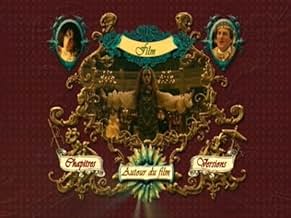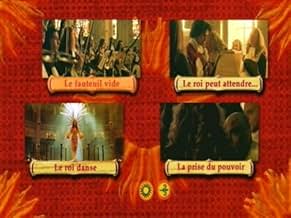This movie focuses on one side of Louis the fourteenth's reign:the patron Sun King.All the best artists who were living at the time were working for the King,from the painters to the musicians to the chefs (see "Vatel" whom Louis stole from Fouquet).
Although a lot of famous historic characters appear (Colbert,Louvois,La Vallière,Maintenon),only five emerge :the threesome KIng/Lulli/Molière and ,at the beginning, two silhouettes ,the Queen mother,Anne d'Autriche ,and the king's cousin,Conti.
The king,played with talent by Benoit Magimel,who shows himself a first-class dancer ,is not exactly the king we find in history books:okay,he rules alone,but a lot of time is given over to arts ..in the first part of his reign,the king was first a soldier :the fine arts connoisseur came only second.(music,dance,gardens...).
Lulli (or Lully depending on whom you ask)was an Italian,so it's very surprising -and it's the main flaw of the whole film- he speaks without the slightest accent.Of course,and probably because c'est à la mode,the director doesn't pass over Lully's homosexuality but he does not lay great stress on it,preferring to give music more than its due:Lully's was majestic and magnificent,the KIng Music par excellence.
Tcheky Kario shines as Molière and gives what will probably be his lifetime role.A jaded and coughing actor/playwright/director whose genius was still brilliant,he had to cope with sanctimonious persons (les dévôts de la compagnie du Saint-Sacrement)and leter with Lully's jealousy.
The last Lully -Molière collaboration,"le bourgeois gentilhomme" (arguably Molière's funniest work),made Molière a visionary who was beginning to see theater as a complete show .The Turkish ceremony " in "le bourgeois gentilhomme" and its celebrated menuet (sadly not included in the film) were forerunners of the musicals.But Lully,who played the "Mufti" in the play ,felt like a buffoon and feared that the king might favor Molière over him.
Lully wanted to be a king and" a king ain't satisfied till he owns everything "as Bruce Springsteen sings ,so the dancer became a wolf .Molière was not his one victim :he actually put down all his rivals and had a complete stranglehold on the king's music.
Some users complain about Courbiau's baroque style:since at least one third of the time is dedicated to arts ,what's the point of being realist and austere ?We're not dealing with Rossellini directing "la prise du pouvoir par LOuis XIV",dash it! Okay ,some sequences are ponderous -Molière's death on stage while playing "le malade imaginaire" did not need this dancers dressed up as skeletons,for instance.But if cinema means change of scenery,"le roi danse" pulls it off with gusto.




























